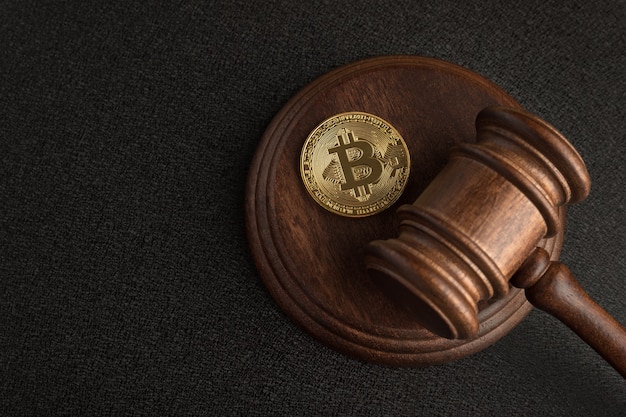Altcoin Regulation in the US: New Rules Expected in the Next 6 Months

Altcoin regulation in the US is anticipated to undergo significant changes in the next six months, potentially impacting the availability and trading of these digital assets as regulatory bodies seek to clarify and enforce existing securities laws.
The landscape of cryptocurrency, particularly altcoin regulation in the US: What new rules are expected in the next 6 months?, is poised for significant change. Investors and enthusiasts alike are keenly watching, seeking clarity and foresight.
Understanding the Current Regulatory Framework for Altcoins in the US
Altcoins, alternatives to Bitcoin, operate within a complex and often ambiguous regulatory environment in the United States. Several agencies are involved in overseeing different aspects of the cryptocurrency market.
The Role of the SEC
The Securities and Exchange Commission (SEC) primarily focuses on whether altcoins should be classified as securities. If deemed securities, these digital assets are subject to rigorous registration and compliance requirements.
The CFTC’s Involvement
The Commodity Futures Trading Commission (CFTC) generally oversees cryptocurrency derivatives markets. However, its role extends to instances where altcoins are used in ways that fall under commodity trading regulations.

- SEC Scrutiny: Many altcoins are under the SEC’s microscope for potential violations of securities laws.
- Compliance Challenges: Startups and established crypto firms face considerable hurdles in navigating these regulations.
- Lack of Clarity: The absence of a unified framework creates uncertainty and hinders innovation.
This fragmented approach often leaves businesses unsure of which rules apply to their specific operations, leading to compliance challenges and potential legal pitfalls.
Key Regulatory Bodies and Their Stance on Altcoins
Several key regulatory bodies are shaping the landscape of altcoin regulation in the United States. Understanding their individual stances is essential for anyone involved in the cryptocurrency market.
The Securities and Exchange Commission (SEC)
The SEC’s primary focus is investor protection. It assesses whether altcoins meet the definition of a security under the Howey Test, which examines if an investment contract exists with an expectation of profit derived from others’ efforts.
The Commodity Futures Trading Commission (CFTC)
The CFTC regulates commodity derivatives, including those based on cryptocurrencies. It seeks to ensure market integrity and prevent fraud and manipulation.
The Financial Crimes Enforcement Network (FinCEN)
FinCEN primarily focuses on anti-money laundering (AML) and combating the financing of terrorism (CFT). It requires cryptocurrency exchanges and other virtual asset service providers (VASPs) to implement robust compliance programs.

The interplay between these agencies can sometimes result in overlapping jurisdictions and inconsistent enforcement, making compliance a complex undertaking for altcoin projects.
Potential New Regulations Expected in the Next 6 Months
Speculation is rife about the new regulations that might emerge in the next six months, driven by technological advancements and growing market participation in altcoins.
Enhanced Reporting Requirements
One potential area of regulation is enhanced reporting and disclosure requirements for altcoin issuers and exchanges. This could involve more detailed information about tokenomics, development roadmaps, and risk factors.
Stricter Enforcement of Securities Laws
The SEC may intensify its enforcement actions against altcoins that are deemed unregistered securities. This could lead to more cease-and-desist orders, fines, and other penalties for non-compliance.
Framework for Stablecoins
Stablecoins, altcoins pegged to a stable asset like the US dollar, are likely to face increased scrutiny. Regulators are concerned about their potential impact on financial stability and may introduce specific rules governing their issuance and operation.
- KYC/AML Compliance: Expect stricter enforcement of Know Your Customer (KYC) and Anti-Money Laundering (AML) regulations to combat illicit activities.
- Consumer Protection Measures: New regulations could aim to protect consumers from fraud, scams, and market manipulation.
- Cross-Border Coordination: As cryptocurrencies operate globally, there’s a growing need for international cooperation in regulatory efforts.
These impending regulatory developments could reshape the altcoin market, impacting the types of projects that can operate legally in the US and how investors engage with these digital assets.
Impact on Altcoin Projects and Investors
New regulations will have far-reaching implications for altcoin projects and investors alike, potentially altering how these digital assets are developed, traded, and utilized.
Increased Compliance Costs
Altcoin projects will likely face increased compliance costs as they navigate new regulatory requirements. This could disproportionately affect smaller projects with limited resources, potentially hindering innovation.
Market Liquidity and Trading Volumes
Stricter regulations may impact market liquidity and trading volumes, particularly for altcoins that are delisted from exchanges due to compliance concerns. This could make it more difficult for investors to buy and sell these assets.
Investor Confidence and Participation
Clear and well-defined regulations could, on the other hand, boost investor confidence and attract institutional participation to the altcoin market. This could lead to greater market stability and maturity.
Altcoin developers and investors must remain informed and agile and prioritize regulatory compliance to navigate the evolving landscape effectively.
Strategies for Navigating the Evolving Regulatory Landscape
Given the uncertainty surrounding the regulation of altcoins, it’s crucial for projects and investors to adopt proactive strategies to adapt and thrive in this dynamic environment.
Legal Counsel and Compliance Expertise
Seeking legal counsel with experience in cryptocurrency regulations is essential. Lawyers can provide guidance on compliance requirements, help assess risks, and represent projects in regulatory matters.
Advocate for Clear and Balanced Regulations
Engage with industry associations and advocacy groups to push for clear and fair regulations that encourage innovation while protecting investors. Participate in public consultations and provide feedback on regulatory proposals.
Due Diligence and Risk Management
Investors should conduct thorough due diligence on altcoin projects before investing. Assess the project’s legal compliance, financial stability, and technological viability.
Staying adaptable and informed is important for navigating the evolving regulatory terrain, ensuring long-term success in the altcoin market.
Predictions for the Future of Altcoin Regulation in the US
Looking ahead, the future of altcoin regulation in the US remains uncertain, with several possible scenarios that could unfold over the coming years.
Harmonized Regulatory Framework
One possibility is that the SEC, CFTC, and FinCEN will eventually collaborate to create a harmonized regulatory framework for cryptocurrencies. This would provide greater clarity and consistency, reducing compliance burdens and fostering innovation.
Increased International Cooperation
As cryptocurrencies operate globally, international cooperation in regulatory efforts is likely to increase. This could involve the sharing of information, coordinated enforcement actions, and the development of common standards.
Technological Solutions for Compliance
Technological solutions, such as blockchain analytics tools and decentralized compliance platforms, may play a bigger role in helping altcoin projects adhere to regulatory requirements. These solutions can automate KYC/AML processes, monitor transactions, and flag suspicious activity.
- Evolving Legal Precedents: Court cases involving cryptocurrencies will likely shape the legal interpretation of existing regulations.
- Legislative Action: Congress could pass legislation to clarify the regulatory status of cryptocurrencies and provide a comprehensive framework.
- Regulatory Sandboxes: Regulators may create sandboxes or pilot programs to test new regulatory approaches and technologies in a controlled environment.
The altcoin market will likely continue to grow and evolve, requiring regulators to adapt and innovate to address new challenges and opportunities.
| Key Point | Brief Description |
|---|---|
| ⚖️ SEC’s Role | Determines if altcoins are securities, requiring registration. |
| 🛡️ Investor Protection | SEC prioritizes safeguarding investors from fraud and manipulation. |
| 📈 Compliance Costs | New regulations may increase costs, affecting smaller altcoin projects. |
| 🌐 International Cooperation | Growing need for global coordination in regulating cryptocurrencies. |
Frequently Asked Questions (FAQ)
▼
An altcoin is any cryptocurrency that is not Bitcoin. The term “altcoin” stands for “alternative coin,” indicating its status as an alternative to the original cryptocurrency.
▼
Altcoins are facing increased regulatory scrutiny due to their potential to be used in fraudulent schemes, their impact on financial stability, and their overall classification under existing securities laws.
▼
The Howey Test is a legal test used to determine whether a transaction qualifies as an “investment contract” and therefore is subject to U.S. securities laws. It’s often applied to altcoins to see if they should be regulated as securities.
▼
Altcoin projects can prepare for new regulations by seeking legal counsel, implementing robust KYC/AML procedures, and actively engaging with regulatory bodies and industry associations.
▼
Clear altcoin regulations could foster innovation, enhance investor confidence, and attract institutional capital into the cryptocurrency market, promoting a more stable financial ecosystem.
Conclusion
In conclusion, the regulatory landscape surrounding altcoins in the US is complex and evolving. As new regulations are expected in the next six months, it’s paramount for altcoin projects and investors to stay informed and proactive. Embracing compliance, seeking expert counsel, and advocating for balanced regulations will be key to navigating the future of altcoins in the United States.





